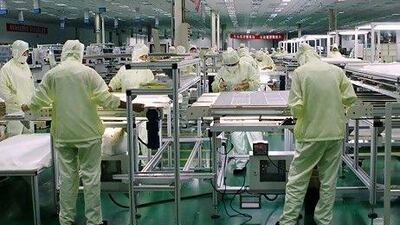YINCHUAN, CHINA // Chinese manufacturers are to blame for the near destruction of the global solar panel industry, or so the story goes.
Churning out panels more cheaply than international competitors, largely by taking advantage of generous subsidies from Beijing, to flood the market and force down prices by 80 per cent over four years is pretty strong evidence to suggest the story is true.
China's huge solar exports sector - worth US$20 billion (Dh73.45bn) a year to Europe alone - has even affected Abu Dhabi through a Masdar investment in an American solar company that filed for bankruptcy. Masdar's plans to build a factory in the UAE have been put on hold.
Given their hard-won dominance of the market, then, Chinese solar makers should be doing a lap of victory. But Lawrence Bai, the director of overseas sales for Ningxia Yingxing Energy Photovoltaic Equipment Manufacturing, a panel maker in western China, is not celebrating.
"The solar business in China developed so fast, so now it's out of control," he says. "There must be many, many companies that will die in the future."
Mr Bai is not the only one worried. Major producers in China - Suntech, Trina, LDK, among the biggest solar companies in the world - are cutting production, employees, or both. The trigger? A trade war between East and West sparked, in part, by China's own success.
At least 14 American, German and French solar companies have been forced to shut down over the past year. The United States has levied tariffs of 31 per cent or more on Chinese solar imports and this month the European Union launched an anti-dumping investigation into Chinese solar exports.
Beijing has threatened retaliatory taxes on European wine and launched its own anti-dumping investigation of American and South Korean exporters of polysilicon, a raw material used in solar panels.
Import duties on polysilicon exports would force many Chinese manufacturers out of business, and help from Beijing - long a supporter of the solar industry with its five-year plans and generous subsidies - will be less forthcoming after it set limits on how much money it is to spend on companies lagging behind, said Martin Simonek, a solar analyst at Bloomberg New Energy Finance.
"Many Chinese market leaders are scaling down production and are no longer able to fund their market shares given the loss they are incurring," he said. "There are still significant differences among the Chinese manufacturers but the majority of them have the same chimera haunting them: too much debt and diminishing cashflows from the weakening market."
The dire situation Mr Simonek and Mr Bai worry about has not yet arrived, at least, at Ningxia Yingxing's factory on the outskirts of Yinchuan, a city in China's less developed western region.
Shareholders on a recent tour strolled along the factory floor, nodding in approval as a manager explained what the hundreds of workers clad in pale green overalls were doing. The factory is one of several in the complex that cover every stage of a solar panel's gestation, from cell to module to the finished product, as wide as a coffee table.
Workers, some living in accommodation provided next to the factories, met in a nearby cafeteria for heaped trays of vegetables and spicy noodles, fuel for the rest of their shift. In this region, a job at the solar company, especially in an office, is considered a good thing.
Despite expected consolidation among solar makers, Ningxia Yingxing is going ahead with an expansion to more than double the factory's annual production from 400 megawatts of panels a year to 1 gigawatt - enough to supply all the renewables Abu Dhabi will have to install to meet its green targets over the next decade.
Mr Bai hopes the Chinese government will put into place policies to create more demand for solar inside China. Sixty per cent of China's solar exports go to Europe and that market is threatened by the EU's anti-dumping investigation and any tariffs that could come out of it.
"The most important thing is we have to open the inside market, because now more than 73 per cent of Chinese solar panels are exported to the European Union," he says.
"We rely on the European market very much. This is a serious problem."
Chinese manufacturers would not be the only ones hurting, said Mr Simonek. European solar panel makers and installers have relied on cheap materials from China.
"Current growth in Europe is largely attributable to cheap Chinese modules, which are being sold at a loss to manufacturers," he said.
"So, paradoxically, the Chinese module manufacturers are subsidising the European market in a way."

